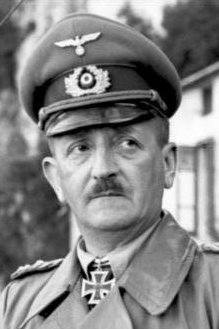In March 1944 Wolff was replaced as Himmler’s representative at the Fuhrer HQ by Hermann Fegelein, an unpleasant smarmy character who had attracted Himmler’s support. Fegelein had been injured fighting on the eastern front and once recovered was appointed to this plum post.
 |
| Pope Pius XII |
On 10th
May 1944 Wolff met with Pope Pius XII, who at the meeting vocalised his opposition to Roosevelt’s call for unconditional surrender[i], viewing it as likely to prolong the
war. The meeting was followed by lunch with German ambassador to the Holy See Ernst von Weizsacker, who was concerned that he was not
informed beforehand about the meeting and the potential for being sacked by his
irascible boss, Joachim von Ribbentrop. Ribbentrop was indeed furious about
the meeting even though he was informed about it by Wolff personally.
Wolff next
appeared on the world stage at the last meeting between Hitler and Mussolini on
20th July. Wolff accompanied Mussolini on a visit to the Wolfschanze
shortly after the attempted assassination of Hitler by Claus von Stauffenberg. Hitler showed Himmler, Mussolini
and Wolff around the scene of the bomb blast.
Hitler then
gave Himmler full powers to deal with the miscreants and Himmler and Wolff
departed to the scene of the action, Berlin[ii], with Himmler saying;
‘Now my hour has come. I
will round up the reactionary gang. I have already given orders for the traitor’s
arrest.’[iii]
A number of
the group of conspirators were never questioned in depth and were kept out of
the Gestapo’s way in concentration camps[iv].
Surrender
Wolff could
see, as well as the next person, that the war was unwinnable and he was
determined to do his best to ensure that he would be as close to the winning
side as possible.
Allen Dulles
In early
February Wolff was in contact with the US agent in Switzerland, Allen Dulles. Wolff spent most of the 6th February with
Himmler and later that day he and von Ribbentrop met with Hitler, who gave them
permission to make overtures to the west[v].
Albert Kesselring
Wolff met
with Dulles in Switzerland in early March, having been assured that the Allies
would deal with neither Hitler, nor Himmler. Wolff claimed that this meeting
was the first time he had ever heard of the systematic murder of the Jews[vi]. In his meeting with
Dulles Wolff assured him that he would talk to the overall German commander in
Italy, Albert Kesselring, to assure him that the SS would be
prepared to surrender Italy to the Allies. Wolff informed his country’s
enemies;
‘Meine Herren, have a little
patience and I will present you Italy on a silver salver.’[vii]
General von Vietinghoff
Not long
after the meeting Kesselring was promoted to Supreme Commander West and was
replaced with General von Vietinghoff; Wolff had not yet persuaded von
Vietinghoff to betray his oath to the Fuhrer by the time Wolff made his second
trip to meet with Dulles on 19th March. At the same time these
meetings were going on Kaltenbrunner was attempting to bargain away the
mythical Alpine Redoubt in an attempt to save Austria from
occupation by the Russians.
On 23rd
March Wolff met with Kesselring and then informed Dulles that Kesselring would
be available to discuss matters further in three days time. On the 24th
March he had a meeting with Himmler and Kaltenbrunner. The following day
Kaltenbrunner drove Wolff to a Bavarian castle and had him questioned by his SD
men. It is highly possible that this was a de-briefing rather than hostile
questioning as Wolff was released. The story he gave after the war was highly
implausible[viii].
End Times
Three days
later Wolff was back in Berlin for a meeting with Himmler, who was recovering
from a cold[ix]
in his suite at the Hohenlychen; Himmler was too busy to see his Wolffchen. At
the end of March Wolff visited his family and arranged for them to move to
South Tyrol. The following day he received a phone call from Himmler telling
him that his family must stay put; they were under Himmler’s personal
protection – hostages for Wolff’s good behaviour. He assured Wolff
‘I still believe as ever,
Wolffchen, that all goes well. If not, then we must all die a heroic death.’[x]
Count Bernadotte
The believer
in a heroic death was busily engaged in negotiations with the Allies through an
intermediary, Count Bernadotte of Sweden.
The
following day Baron Parilli[xi], met with Dulles and
informed him that Wolff had been too depressed to make the trip. On the 15th
April Himmler ordered Wolff to report to him in person; Kaltenbrunner was
present and accused Wolff of negotiating an armistice on the Italian front.
Wolff denied this and offered to speak to Hitler. He and Kaltenbrunner set off
for Berlin, where on the 18th Hitler apparently agreed that Wolff
could continue with his efforts to negotiate with the Allies[xii]. According to Wolff
Hitler told him;
‘Should you fail I shall
have to drop you exactly like Hess.’[xiii]
On 25th
Wolff surrendered Italy to the Allies; but this action was more in theory than
in practise as Kesselring’s[xiv] men did not lay down
their arms until 2nd May. And it can hardly have been what the
Fuhrer intended at his meeting with Wolff.
After the War
Wolff was
arrested on 13th May and imprisoned at Schoneberg; and at the Nuremberg Trials gave evidence against his colleagues. In 1947 he was
transferred to the care of the British. In November 1948 Wolff was tried and
sent to prison for five years; he had after all been a member of an illegal
group that had perpetrated terrible crimes; but due to his inability to
remember anything about the Holocaust Wolff was spared the ignominious fate of
many other senior SS officials.
Like many
others Wolff was protected by the US, who accepted his claim on face value,
despite Wolff’s position as number three in the SS hierarchy[xv]. He was released in the
summer of 1949 when his sentence was reduced to four years.
In 1962 when
evidence emerged in the trial of Adolf Eichmann, that Wolff was more involved
in the deportation of the Jews than he’d admitted to[xvi], Wolff was tried in
Germany in 1964 and sentenced to 15 years imprisonment. He was released in 1969
due to ill-health[xvii]
but managed to live until 1984.
From the
late 1970’s Wolff made a living lecturing on his knowledge of the SS and his
relationship with Himmler. He also appeared in television documentaries. But
his memories of his time in the SS were faulty and self serving; a failing
Wolff had always suffered from.
Bibliography
Hitler –
Nemesis – Ian Kershaw, Penguin 2001
Anatomy of
the SS State – Helmut Krausnick & Martin Broszat, Paladin 1970
Top Nazi –
Jochen von Lang, Enigma Books 2005
Heinrich
Himmler – Peter Longerich, Oxford University Press 2012
Himmler –
Peter Padfield, Cassell & Co 2001
The Rise and
Fall of the Third Reich – William L Shirer, Book Club Associates 1985
www.wikipedia.en
[i]
The call for unconditional surrender dragged the war on unnecessarily for more
than a year than might otherwise have been the case and led to the death of
millions more people who might never have died.
[ii]
Whose whereabouts at key times during the period were unknown and whose actions
appear suspect at best. It is believed that Himmler knew about the conspirators
but failed to act against them
[iii]
Himmler - Padfield
[iv]
Possibly because Himmler did not want his possible involvement brought to light.
The Gestapo had no control over the concentration camps, with the concentration
camp system under the control of Oswald Pohl
[v]
At a meeting with Himmler on 6th February Hitler orders that no Jew
be left alive; a blow to Himmler’s plans to use Jews as pawns in his plans to
stay in control in Germany after the war
[vi]
A story he clung to for the rest of his life.
[vii]
Himmler - Padfield
[viii]
Wolff claimed he had told Himmler that the high level meetings with Dulles were
negotiations to release a captured Standartenfuhrer, a risible story that
Himmler and Kaltenbrunner would have difficulty in believing
[ix]
The hypochondriac Himmler claimed he had flu
[x]
Himmler - Padfield
[xi]
Who had acted as an intermediary between Wolff and Dulles
[xii]
There is no corroborative evidence for Wolff’s version of events
[xiii]
Himmler - Padfield
[xiv]
Von Vietinghoff had been replaced by Kesselring
[xv]
Rudolf Brandt, one of Wolff’s staff and Himmler’s secretary was executed, but
Wolff stuck to his ignorance like the lucky talisman it was
[xvi]
The deportation of 300,000 Jews to the death camp at Treblinka and the deportation
of Italian Jews to Auschwitz
[xvii]
His civil rights were restored in 1971






No comments:
Post a Comment
Note: only a member of this blog may post a comment.